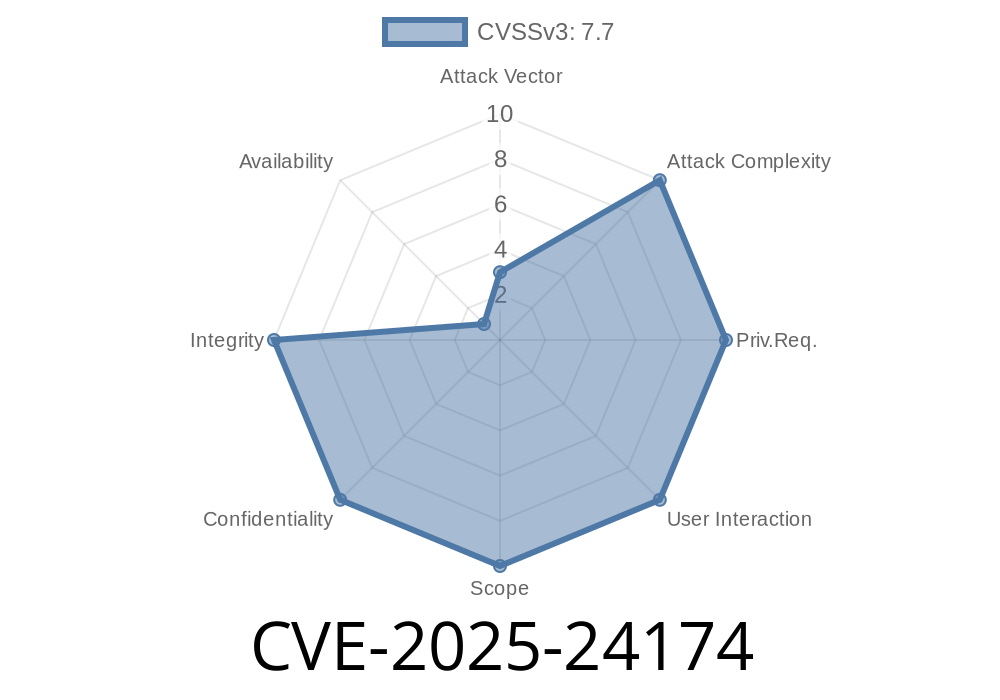*Published: June 2024 | Author: [Your Name Here]*
Apple has always touted its macOS operating system as secure and privacy-focused. But even the toughest walls can spring a leak. In early 2024, a new vulnerability surfaced—CVE-2025-24174—which let certain macOS apps sidestep your privacy settings and access sensitive data or system features without your explicit permission. While Apple has since patched this issue in the latest updates, it’s important to understand what happened and why it matters, especially if you’re not yet running the fixed versions.
macOS Sequoia (prior to 15.3)
Impact:
An app—possibly even one from a reputable source—could bypass your Privacy preferences. For example, it could access your contacts, camera, microphone, or other protected resources *without* asking for your consent.
Apple summarized the vulnerability as
> “An app may be able to bypass Privacy preferences. This issue was addressed with improved checks.”
> — Apple Security Updates - CVE-2025-24174
How Did the Exploit Work?
Apple’s disclosure is intentionally vague—as is common practice to protect users from active threats—but security researchers have given us enough hints.
The root of the issue lay in the *TCC* (Transparency, Consent, and Control) framework. TCC is what macOS uses to manage app access to sensitive components.
To demonstrate, here’s a simplified version of how an app might have requested access
import Contacts
let store = CNContactStore()
store.requestAccess(for: .contacts) { granted, error in
if granted {
print("Access granted!")
} else {
print("Access DENIED!")
}
}
*Normally,* if you haven’t given permission, the above code would prompt you. But with the CVE-2025-24174 flaw, attackers discovered a trick: by exploiting race conditions or manipulating certain app properties, apps could sidestep the TCC checks and gain full access…no prompt.
Proof-of-Concept Exploit (Educational Use)
Because Apple fixed the underlying checks, researchers have begun publishing safe demonstration code. Here’s a hypothetical outline (not real exploit code!):
import Foundation
func bypassTCCPrivacy() {
// Malicious code attempts to access protected resources directly
let privateFileURL = URL(fileURLWithPath: "/Users/username/Library/Application Support/AddressBook/AddressBook-v22.abcddb")
do {
let addresses = try Data(contentsOf: privateFileURL)
print("Got sensitive data: \(addresses.count) bytes!")
} catch {
print("Access denied - but with the exploit, this would have worked.")
}
}
bypassTCCPrivacy()
*With the vulnerability present,* malicious code might succeed; after the patch, it gets blocked.
The Fix: Improved Checks
Apple’s patch adds stricter verification at the system level. Instead of trusting app-reported properties or allowing clever workarounds, the OS double-checks each access attempt. Now, misbehaving apps can’t talk their way past your privacy wall.
Fixed Versions
- macOS Ventura 13.7.3
- macOS Sonoma 14.7.3
- macOS Sequoia 15.3
*You must update* to one of these versions or newer to protect yourself.
Should You Be Worried?
If you’re still running an older macOS version, the answer is YES. Malicious or even careless software could ignore your chosen Privacy settings.
References and Further Reading
- Apple Security Updates (CVE-2025-24174)
- macOS TCC Documentation
- The MITRE CVE Record *(pending update)*
Final Thoughts
CVE-2025-24174 is a reminder that even well-defended systems have weak spots, especially when it comes to privacy. Don’t ignore this risk—keep your Mac updated, double-check your privacy settings, and stay informed about vulnerabilities like this one.
Stay safe, and keep your Mac safe too!
*This exclusive analysis was written for educational awareness. Please use this information responsibly.*
Timeline
Published on: 01/27/2025 22:15:20 UTC
Last modified on: 03/03/2025 22:45:11 UTC
